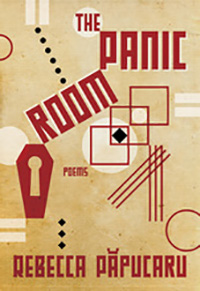Reviews
Poetry Review by Sara Cassidy
Rebecca Păpucaru, The Panic Room (Madeira Park: Nightwood, 2017). Paperbound, 96 pp., $18.95.
 Quebec writer Rebecca Păpucaru is an alert and intrepid craftsperson. I had to take a few runs at the collection’s first poems to get oriented, because the narrative lines are not taut or linear and the metaphors leap realms, with poems ending far from where they cozily begin, the connection between then and now, there and here, fleeting, confounding, and exciting.
Quebec writer Rebecca Păpucaru is an alert and intrepid craftsperson. I had to take a few runs at the collection’s first poems to get oriented, because the narrative lines are not taut or linear and the metaphors leap realms, with poems ending far from where they cozily begin, the connection between then and now, there and here, fleeting, confounding, and exciting.
“I pass the workday in throes of Dadaist delight” the very first poem, “My Anne,” begins. The collection does have Dadaist elements, such as collage — of images, anecdotes — and resistance to accepted standards — of what a poem can do, what a woman can say. Surrealism, another Dadaist delight, often leavens and unsteadies. “Papa sends me to cottage country/with six new toothbrushes” begins “Cottage Country." Another poem starts with exclaiming, “And the theory! You couldn’t move in their bedroom for the theory!” (“Said Saint George to the Maiden: Wait in the Car”). Nevertheless, Păpucaru’s confidence and clever self-awareness allow the strange land of her poems to be possible, then probable, and then true.
In his blurb on the back cover, poet Jacob Schier writes, “Panic Roomis a truly exciting event in contemporary literature and in particular Canadian Jewish Literature.” Păpucaru is a second-generation Eastern European Jewish immigrant grappling with her roots. In ”On Watching an Eastern Bloc Comedy,” she writes, “I’m one generation apart from all this, and ashamed. Of my father, before his/refrigerator, mourning age spots on lettuce.” In “My Anne,” she admits a disconnect: “I’m monosyllabic, dark, not some cobbler of laced felt/slippers prized by Black Sea rustics.”
In “Prague Fugue,” which takes place at, presumably, the Czech Republic’s Jewish Museum, she inverts institutionalized memory and suggests that healing may be had by the museum’s curators “filching from the relics displayed”:
A speck from a silver spice box, unembossed.
A blue thread dangling from a prayer shawl
for young boy, c. 1811. A nail’s worth of wax
from the dormant pit of a menorah,
provenance doubtful.
Smuggled under the tongue, a scrap
small enough to run any gauntlet will harden
into new enamel. For now, the throbbing
toothache of reprieve.
Later, in “Prayer for the Headless Boar,” Păpucaru contends again with how the Holocaust is remembered. “Must you dawdle in the Jewish ghetto?” the poem begins. Though she risks being separated from her tour group in Old Nice, France, the speaker continues to stare at a plaque “dedicated to victims/ of hitlérienneviolence” while her fellow tourists move on to apéritifs. She asks (note the engineered breeziness), “What should it matter to you if the others can’t spare it a moment?” Her first encounter with the word “hitlérienne”— “Hitler was an adjective”—has activated the past, but she decides to keep the haunting discovery to herself, musing sardonically, “you’re on holiday. Why spoil it for the others?”
Păpucaru implies that, with lineage that has been violated and fractured, family—and self—become fused with spirit. In “Inauguration,” a girl remembers her mother’s inventions at Seder, the Passover meal for which people often leave a door open in case the messiah Elijah arrives. The mother secretly drains Elizah’s wine goblet and nibbles the matzo on his plate. But, the girl can’t tell where the pretending begins and ends. “Even the curtain blowing over the open window/was her.” The poem ends with her hospitalized mother becoming spirit for real: “Talk to her, says the nurse. She can still hear, I swear.” The poem’s entire final section is five words: “This can’t be my life.” Like much of Păpucaru’s work, the line reads several ways: such loss can’t be life; “this”—the material world—is not life; one’s life is never singular…
In a villanelle about the death of a grandfather with “ninety-one years of life stowed in one chest” (“Ninety-one years”), who in his younger years “Christianized [his] dark curls with Brylcreem,” spirit is again the most reliable shape for family. “We laid hands upon/what remained of him, indivisible as ether.”
Păpucaru’s assuredly feminist poems “Rosalind Franklin in open-toe sandals”—about the English chemist and crystallographer Rosalind Elsie Franklin, whose study of x-ray images of dna led to the discovery of the dna double helix, and who died of ovarian cancer at thirty seven—and “The Panic Room (Glue Ear at forty-five)” are feats of metaphor wizardry. The closing poems, about a love affair with a truck driver named Didier, showcase Păpucaru’s gift for oblique insight and connecting the seemingly disparate.
—Sara Cassidy









